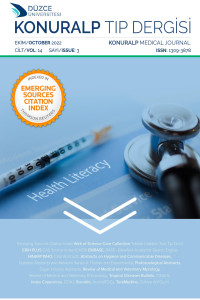Abstract
Objective:It is important to evaluate the nutrition of patients in palliative care centers. Most patients are unrecognized and lacking treatment, as there is no consensus on ways to scan, diagnose, treat and follow the malnutrition, and the lack of adequate awareness and training of healthcare professionals. This study aims to evaluate the approaches and awareness of healthcare professionals in Turkey who support nutrition in Palliative Care Centers.
Material Method: A survey, prepared by researchers, conducted to assess the effectiveness of healthcare professionals in patient nutrition, was conducted on a virtual basis in all healthcare professionals who were fully employed, accessible and volunteered with palliative care patients. The data was evaluated through descriptive and analyzing statistical methods.
Findings: The average age of the 105 medical professionals who participated in our study was 36.4±9.3 (25-59), of whom 68 (64.8%) were women and 37 (35.2%) were men. Sixty-seven (63.8%) of the participants, most of whom were physicians, were specialists, 30 (28.6%) were assistants and general practitioners, and 8 (7.6%) were nurses. When asked how many of their patients they started feding products, 38 people (36.2%) said, with 41-60%. If you think you've got enough recognition of nutritional content, there were 28 people who said yes (26.7%), 30 people who said no (28.6%), and 47 people (44.8%) who said sometimes. When asked what they considered the most when planning a feeding product, 95 people (90.5%) said that they cared about the patient's request, compared to the calories and content of the product.
Discussion: Our study found that participants were largely absent from knowledge and awareness, and observed differences in patient attitudes. Most participants require neutral education and continuity in order to have awareness.
References
- Resources 1. Sürmeli DM, Akçiçek F. Palyatif Bakım: Tanımı ve Tarihçesi. Turkiye Klinikleri J Gen Surg-Special Topics. 2016;9(1):8-1.
- 2. Smith TJ, Temin S, Alesi ER, Abernethy AP, Balboni TA, Basch EM ve ark. American Society of Clinical Oncology provisional clinical opinion: the integration of palliative care into standard oncology care. J Clin Oncol. 2012;30(8):880-887.
- 3. Kapoor N, Naufahu J, Tewfik S, Bhatnagar S, Garg R, Tewfik I. A prospective randomized controlled trial to study the impact of a nutrition-sensitive intervention on adult women with cancer cachexia undergoing palliative care in India. Integr Cancer Ther 2017;16(1):74–84
Abstract
Amaç: Palyatif bakım merkezlerinde hastaların beslenmesinin değerlendirilmesi önemlidir. Malnütrisyonun taranması, teşhis edilmesi, tedavi edilmesi ve takip edilmesinin yolları konusunda fikir birliğinin olmaması,sağlık profesyonellerinin farkındalıklarının ve eğitimlerinin eksikliği nedeniyle çoğu hasta tanınmamaktadır ve tedaviden yoksundur. Bu çalışma, Türkiye'de palyatif bakım merkezlerinde hastaların beslenmeyi destekleyen sağlık çalışanlarının yaklaşımlarını ve farkındalıklarını değerlendirmeyi amaçlamaktadır.
Gereç Yöntem: Sağlık profesyonellerinin hasta beslenmesindeki etkinliğini değerlendirmek için araştırmacılar tarafından hazırlanan anket, palyatif bakım hastaları ile çalışan, erişilebilir ve gönüllü olan tüm sağlık profesyonellerine sanal ortamda uygulandı. Veriler tanımlayıcı ve analiz edici istatistiksel yöntemlerle değerlendirildi.
Bulgular: Çalışmamıza katılan 105 tıp profesyonelinin yaş ortalaması 36,4±9,3 (25-59) olup, 68'i (%64,8) kadın, 37'si (%35,2) erkekti. Çoğunluğu hekim olan katılımcıların 67'si (%63,8) uzman, 30'u (%28,6) asistan ve pratisyen hekim ve 8'i (%7,6) hemşiredir. Beslenme ürününü kendileri başladıkları hasta sayıları sorulduğunda 38 kişi (%36,2) %41-60 oranında yanıt verdi. Besin içeriği konusunda ürünleri yeterince tanındığınızı düşünüyor musunuz ? sorusuna evet diyen 28 kişi (%26,7), hayır diyen 30 kişi (%28,6) ve bazen diyen 47 kişi (%44,8) vardı. Bir beslenme ürünü planlarken en çok neyi düşündükleri sorulduğunda 95 kişi (%90,5) ürünün kalori ve içeriğine kıyasla hastanın isteğini önemsediklerini söyledi.
Tartışma: Çalışmamız, katılımcıların büyük ölçüde bilgi ve farkındalık açısından eksiklerinin olduğunu ve hasta tutumlarında farklılıklar yaşandığını göstermiştir.Katılımcıların çoğu farkındalığın olması için nütrisyon eğitimine ve devamlılığına ihtiyaç duymaktadır.
Keywords
References
- Resources 1. Sürmeli DM, Akçiçek F. Palyatif Bakım: Tanımı ve Tarihçesi. Turkiye Klinikleri J Gen Surg-Special Topics. 2016;9(1):8-1.
- 2. Smith TJ, Temin S, Alesi ER, Abernethy AP, Balboni TA, Basch EM ve ark. American Society of Clinical Oncology provisional clinical opinion: the integration of palliative care into standard oncology care. J Clin Oncol. 2012;30(8):880-887.
- 3. Kapoor N, Naufahu J, Tewfik S, Bhatnagar S, Garg R, Tewfik I. A prospective randomized controlled trial to study the impact of a nutrition-sensitive intervention on adult women with cancer cachexia undergoing palliative care in India. Integr Cancer Ther 2017;16(1):74–84
Details
| Primary Language | English |
|---|---|
| Subjects | Health Care Administration |
| Journal Section | Articles |
| Authors | |
| Publication Date | October 20, 2022 |
| Acceptance Date | September 9, 2022 |
| Published in Issue | Year 2022 Volume: 14 Issue: 3 |


